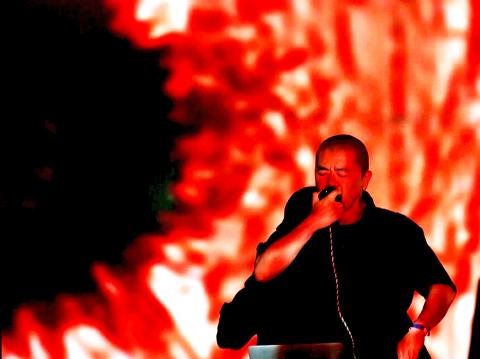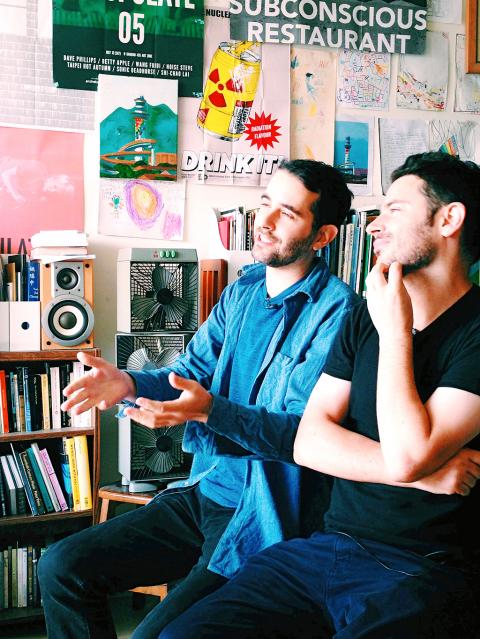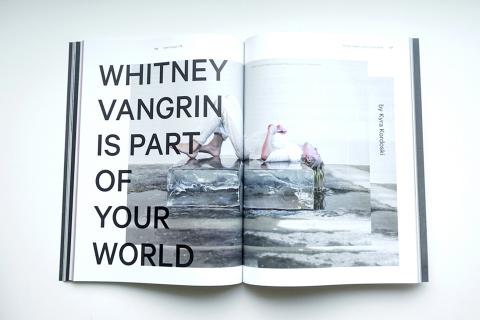If you can stay awake tomorrow night, the White Fungus 15 release party begins at 11:50pm at Korner. Founded in 2004 by New Zealand brothers Ron Hanson and Mark Hanson, the Taichung-based arts magazine has since endeavored to introduce Taiwanese artists to international audiences. The founders are also no strangers to throwing a good launch party without the crowd getting too rowdy — they hosted a sound art event at Huashan 1914 on Valentine’s Day last year and it was pretty chill.
On the bill tomorrow night is sound art pioneer Wang Fu-jui (王福瑞) and noise artist Noise Steve, or Steve Chen (陳史帝). They, along with other local talents, will be joined by the New York-based performance and video artist Whitney Vangrin and the Tokyo-based experimental musician KK Null.
Tickets are inclusive of a free copy of the magazine’s latest issue, the contents of which include a feature on Taiwanese sound artist Lin Chi-wei (林其蔚) and an interview with Detroit-born techno DJ and producer Jeff Mills.

Photo courtesy of Mikiko Kishino
■ The White Fungus 15 release party is tomorrow at 11:50pm and lasts until Sunday at 5am at Korner, B1 200, Roosevelt Rd Sec 4, Taipei City (台北市羅斯福路四段200號B1). For more information, check out: www.facebook.com/events/500248170169885
■ Admission is NT$650 at the door and includes a free copy of the latest issue of White Fungus

Photo courtesy of Johnny Hu

Photo courtesy of White Fungus

The unexpected collapse of the recall campaigns is being viewed through many lenses, most of them skewed and self-absorbed. The international media unsurprisingly focuses on what they perceive as the message that Taiwanese voters were sending in the failure of the mass recall, especially to China, the US and to friendly Western nations. This made some sense prior to early last month. One of the main arguments used by recall campaigners for recalling Chinese Nationalist Party (KMT) lawmakers was that they were too pro-China, and by extension not to be trusted with defending the nation. Also by extension, that argument could be

Aug. 4 to Aug. 10 When Coca-Cola finally pushed its way into Taiwan’s market in 1968, it allegedly vowed to wipe out its major domestic rival Hey Song within five years. But Hey Song, which began as a manual operation in a family cow shed in 1925, had proven its resilience, surviving numerous setbacks — including the loss of autonomy and nearly all its assets due to the Japanese colonial government’s wartime economic policy. By the 1960s, Hey Song had risen to the top of Taiwan’s beverage industry. This success was driven not only by president Chang Wen-chi’s

Last week, on the heels of the recall election that turned out so badly for Taiwan, came the news that US President Donald Trump had blocked the transit of President William Lai (賴清德) through the US on his way to Latin America. A few days later the international media reported that in June a scheduled visit by Minister of National Defense Wellington Koo (顧立雄) for high level meetings was canceled by the US after China’s President Xi Jinping (習近平) asked Trump to curb US engagement with Taiwan during a June phone call. The cancellation of Lai’s transit was a gaudy

The centuries-old fiery Chinese spirit baijiu (白酒), long associated with business dinners, is being reshaped to appeal to younger generations as its makers adapt to changing times. Mostly distilled from sorghum, the clear but pungent liquor contains as much as 60 percent alcohol. It’s the usual choice for toasts of gan bei (乾杯), the Chinese expression for bottoms up, and raucous drinking games. “If you like to drink spirits and you’ve never had baijiu, it’s kind of like eating noodles but you’ve never had spaghetti,” said Jim Boyce, a Canadian writer and wine expert who founded World Baijiu Day a decade